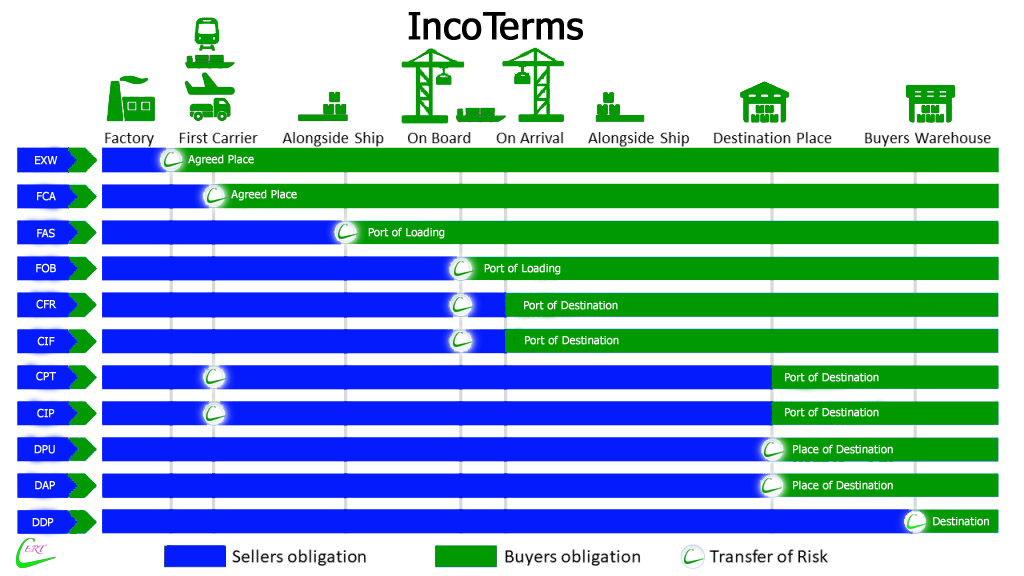In Incoterms 2020, this rule has been renamed “Delivered at Place Unloaded (DPU)”
“Delivered at Terminal” means that the seller delivers when the goods, once unloaded from the arriving means of transport, are placed at the disposal of the buyer at a named terminal at the named port or place of destination. “Terminal” includes a place, whether covered or not, such as a quay, warehouse, container yard or road, rail or air cargo terminal. The seller bears all risks involved in bringing the goods to and unloading them at the terminal at the named port or place of destination.
Delivered At Terminal (DAT)
Can be used for any transport mode, or where there is more than one transport mode. The seller is responsible for arranging carriage and for delivering the goods, unloaded from the arriving conveyance, at the named place.

Risk transfers from seller to buyer when the goods have been unloaded.
‘Terminal’ can be any place – a quay, container yard, warehouse or transport hub.
The buyer is responsible for import clearance and any applicable local taxes or import duties.
Things to watch for:
The place for delivery should be specified as precisely as possible, as many ports and transport hubs are very large.
A useful rule, well suited to container operations where the seller bears responsibility for the main carriage.
Delivered At Terminal (DAT): Further information
A common scenario is for delivery to a container yard (CY), in which case there may be Terminal Handling Charges (THC) for the account of the buyer.
If the specified place is an inland clearance depot, a free trade zone or similar, then use of this rule is straightforward – the goods can be delivered uncleared.
However if clearance has to take place before delivery – for example at a border crossing – then this will require close cooperation between the buyer and seller.
Delays in the clearance process can lead to unexpected costs or demurrage. Nominally these are payable by the buyer, but there can disputes about the cause of the delay – perhaps the seller was at fault due to documentation errors or omisions?
(Typical issues: buyer needs to present original documents to authorities to obtain clearance.)
Delivered at Place Unloaded (DPU)
In Incoterms 2010, this rule was referred to as Delivered At Terminal
There are no restrictions on the named place – for example it can be a transport hub, a warehouse or the buyer’s depot.
The seller is responsible for arranging carriage and for delivering the goods, unloaded from the arriving conveyance, at the named place.

Risk transfers from seller to buyer when the goods have been unloaded. This is the only rule that requires the seller to unload the goods in order to complete delivery.
The buyer is responsible for import clearance and any applicable local taxes or import duties.
A useful rule, well suited to container operations where the seller bears responsibility for the main carriage.
Things to watch for:
The place must be specified precisely, as many transport hubs are very large
Delivered at Place Unloaded (DPU): Further information
A common scenario is for delivery to a container yard (CY), in which case there may be Terminal Handling Charges (THC) for the account of the buyer.
If the specified place is an inland clearance depot, a free trade zone or similar, then use of this rule is straightforward – the goods can be delivered uncleared.
However complications can arise if the goods have to go through a clearance point before delivery. Clearance of the goods may require close liaison between the carrier and the buyer, and where this goes wrong, there can be delays and disputes about demurrage.
(Typical issues: buyer needs to present original documents to authorities to obtain clearance.)
Use of this rule for delivery at the buyer’s depot can be problematical
Will the carrier be equipped to unload the goods without the assistance of the buyer?
The buyer may have fork-lift trucks, trolleys etc. available, but there may be Health
and Safety or legal restrictions on their use by non-employees.
For more details regarding the updated 2020 terms, please speak with your nominated shipping company or refer to the International Chamber of Commerce.
There are two key changes in Incoterms ® 2020 compared to the last edition:
- DAT (Delivered at Terminal) is renamed Delivered at Place Unloaded (DPU)
- FCA (Free Carrier) now allows for Bills of Lading to be issued after loading
Other changes include:
- CIF (Cost, Insurance and Freight) and CIP (Carriage and Insurance Paid To) set out new standard insurance arrangements, but the level of insurance continues to be negotiable between buyer and seller.
- Where listed, cost allocation between buyer and seller is stated more precisely – one article lists all costs the seller and the buyer are responsible for.
- FCA (Free Carrier), DAP (Delivered at Place), DPU (Delivered at Place Unloaded) and DDP (Delivered Duty Paid) now take account of buyer and seller arranging their own transport rather than using a third party.
- Security-related obligations are now more prominent.
- “Explanatory Notes for Users” for each Incoterm® have replaced the 2010 edition’s Guidance Notes, and are designed to be easier for users.
- CIP now requires as default insurance coverage ICC A or equivalent. It was ICC C under Incoterms® Required insurance coverage under CIF remains.


